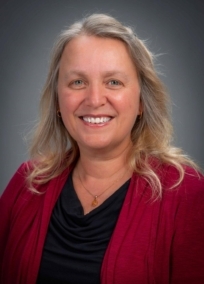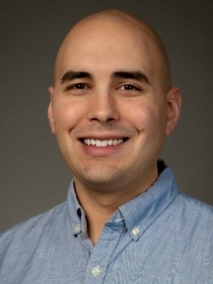About Us
The Science-based Artificial Intelligence and Machine Learning Institute (SAMI) was established in 2020 and combines the strengths of NETL’s energy computational scientists, data scientists and subject matter experts with strategic partners to drive solutions to today’s energy challenges. The institute has a vision to leverage science-based models, artificial intelligence, and machine learning (AI/ML) methods, data analytics and high-performance computing to accelerate applied technology development for clean, efficient, and affordable energy production and utilization.
Leadership Team

Kelly Rose
Technical Director
Kelly Rose Bio
Kelly Rose is a geology, geo-data science researcher with the National Energy Technology Laboratory’s (NETL) Research Innovation Center. Her research at NETL is focused on using geologic and geospatial science to reduce uncertainty about, characterize and understand spatial relationships between energy, engineered-natural systems at a range of scales. Her work involves development of new data-driven methods and tools for analysis of offshore energy, oil & gas, rare earth element, groundwater, carbon storage, and geothermal systems. Rose’s research interests also include development of software driven solutions to common science-data curation, discovery and inter-operability challenges. She has served on advisory committees including the Department of Interior’s National Geologic and Geophysical Data Preservation Program, United Nations Environmental Programme’s global outlook on methane gas hydrates, and the University of Southern California’s Induced Seismicity and Reservoir Monitoring Consortiums.
She is associate editor for the Journal of Sustainable Energy Engineering, and is also NETL’s Technical Portfolio Lead for the Advanced Offshore Energy Research Portfolio https://edx.netl.doe.gov/offshore Rose is Principal investigator for NETL’s Energy Data eXchange (EDX), an online, public and private research curation and virtual laboratory platform developed by Rose and the EDX team for DOE FE, https://edx.netl.doe.gov . Rose is co-author of 1 patented, 8 trademarked, 2 copyrighted custom tools, and more than 100 published technologies and studies. Throughout her career at NETL, Rose has had the honor of mentoring and working with more than forty five STEM research interns and fellows. She holds geology degrees from Denison University, B.S., Virginia Tech, M.S., and Oregon State University, Ph.D.
For additional information from my vitae please see https://orcid.org/my-orcid

Wissam Saidi
Deputy Technical Director
Wissam Saidi Bio
Wissam Saidi serves as the head of the Computational Materials Engineering Team within the Computational Science Engineering Directorate at NETL. Dr. Saidi is a seasoned researcher specializing in first-principles quantum mechanical methods, synergistically employing data informatics and artificial intelligence to optimize and design materials with customized properties. Notably, Dr. Saidi has applied these tools to explore a diverse range of energy-related materials, encompassing catalysts, sensors, critical minerals, and materials tailored for extreme environments.

Tammie Borders
Associate Director of the Computational Science and Engineering Directorate
Tammie Borders Bio
Tammie Borders is the Associate Director of the Computational Science and Engineering Directorate at DOE’s National Energy Technology Laboratory. Prior to this position, Dr. Borders was a Senior Member of Technical Staff in the Proliferation Signature & Data Exploitation department at Sandia National Laboratories. She completed her Ph.D. in computational physical chemistry from University of North Texas and has led national security and energy systems research across next-generation artificial intelligence, advanced nanotechnology-based materials by design and transient chemical dynamics, digital engineering, and decision-science frameworks.
Tech Team
SAMI has established a technical assistance team with capabilities in deep learning, time series modeling, image segmentation, containerization, science-based learning, and more. This team offers strategic assistance and consultancy to leadership and research teams.

Chad Rowan
Chad Rowan Bio
Mr. Chad Rowan has over 20 years of experience in research data management and project management with FEMA, NOAA, DOE, and other federal government agencies. He earned a Master’s degree in Geography from West Virginia University with a focus on Geographic Information Systems. He served as NETL’s Energy Data Exchange Operations Lead for 12 years until recently converting to a federal Research Scientist role within the Computational Sciences and Engineering team.
Capabilities:
- Research Data Life-Cycle Management
- Data Governance, Ethics, and Compliance
- Spatial Data Science and Analytics
- Science-Based Learning
- Workflow Process Improvement

Mike Sabbatino
Mike Sabbatino Bio
Michael has been involved in researching machine learning and natural language processing for data extraction at the National Energy Technology Laboratory (NETL). This research has involved geospatial data extraction. His contributions have helped to advance the field and make data extraction more efficient and accurate.

Zach Johnson
Zach Johnson Bio
Zachary (Zach) Johnson has a background in mathematics and is currently a research product developer with LRST, working as an onsite contractor to the National Energy Technology Laboratory in Albany, Oregon. His experience as a software engineer and machine learning engineer in several domains prepared him for his current role supporting GAIA and various tools and projects within NETL. He leverages his skills to develop tools, models, and methodologies supporting the work of scientists and engineers.

William Trehern
William Trehern Bio
William Trehern is a research general engineer on the Computer Science and Engineering team. He graduated from Texas A&M University with a doctoral degree in materials science and engineering with a focus on Materials Informatics and Data Science. His current research uses Large Language Models to extract data from scientific literature for use in materials design and discovery using machine learning methods. Additionally, he is working toward data quality assurance, management and augmentation methods using LLM technology. His previous research work focused on materials design using data curation, feature engineering, machine learning and multi-objective optimization.
Technical Advisory Group (TAG)
The SAMI Technical Advisory Group (TAG) is composed of NETL researchers who are thought leaders and research innovators in data science or AI/ML. These TAG members serve as ambassadors between their directorates to the Institute.

Jen Bauer
Jen Bauer Bio
Jennifer Bauer is a Geo-Data Scientist with the Department of Energy’s National Energy Technology Laboratory. Jennifer’s work applies data science, machine learning, programming, spatio-temporal statistics, and GIS to support several research projects aligned to onshore and offshore risk reduction and prevention, characterizing energy infrastructure integrity, informing infrastructure reuse strategies and energy remediation efforts, identifying energy communities, and supporting energy transitions. Products of her work include the public release of terabytes of data, several custom-built tools and applications, and publications. Bauer serves as the Chair for DOE’s Geospatial Science Steering Committee (GSSC), a member on the Deepwater Horizon Long Term Data Management Coordination Advisory team, and a representative for a National Petroleum Council study on energy infrastructure. She has a M.S. in Geography from Oregon State University and a B.S. in Marine Biology from Texas A&M University.

Madison Wenzlick
Madison Wenzlick Bio
Madison Wenzlick is a Research General Engineer at NETL in Albany, Oregon. She supports the development and modeling of materials using machine learning. She is also interested in data management techniques for efficient data capture, and methods of improving model interpretability, including uncertainty quantification.

Djuna Gulliver
Djuna Gulliver Bio
Djuna Gulliver has worked as a research scientist for the Research and Innovation Center at NETL-DOE since 2009. Her expertise is in geomicrobiology in energy and energy-impacted environments. She is currently analyzing the microbial communities in various systems, such as hydrogen storage reservoirs, carbon storage reservoirs, shale gas reservoirs, acid mine drainage, and coalbed methane reservoirs. She is also developing biological technologies to upgrade unused resources (such as CO2, syngas, or unminable coal) into value-added products. She utilizes next generation sequencing coupled with bioinformatic analysis to characterize the abundant microbial taxonomy, potential metabolic capability, and microbial activity of these natural and engineered systems

Ruishu Wright
Ruishu Wright Bio
Dr. Ruishu F. Wright is a Research Physical Scientist on the DOE National Energy Technology Laboratory’s Functional Materials Team. She serves as Technical Portfolio Lead (TPL) for Natural Gas Infrastructure FWP and co-TPL for Natural Gas Decarbonization and Hydrogen Technologies FWP. She leads and coordinates R&D efforts of an interdisciplinary team to develop real-time sensors and functional sensitive materials to monitor and mitigate corrosion and gas leaks of natural gas pipelines, enable subsurface geochemical monitoring in support of subsurface hydrogen-natural gas storage, wellbore integrity monitoring of carbon storage wells, and plugging abandoned wells.
Dr. Wright’s expertise lies in advanced sensors development for structural health monitoring and environmental detection for energy infrastructure using distributed and nondestructive sensor technologies to ensure safe, reliable and resilient infrastructure for, among other things, natural gas and hydrogen transportation, subsurface wellbores, CO2 storage systems, and plugged abandoned wells. She has extensive experience in design and development of functional materials (e.g. metallic thin films, metal oxides, nanomaterials) to enable various sensor platforms(e.g. fiber optic sensors, passive wireless sensors, electrochemical sensors). She also has strong expertise in corrosion and materials degradation in natural gas pipelines and in deep wells with extreme conditions, such as high-temperature, high-pressure (HTHP) environments. Dr. Wright holds a Ph.D. from the Pennsylvania State University, and she has published more than 70 technical articles and given more than 70 presentations at conferences, and holds ten pending and awarded U.S. patents on sensor technologies. She has won 2023 R&D 100 Award.

Vyacheslav Romanov
Vyacheslav Romanov Bio
Dr. Vyacheslav (Slava) Romanov is a Physical Scientist at the Department of Energy, National Energy Technology Laboratory. He holds a PhD in Chemistry from University of Pittsburgh and PhD in Physics and Mathematics from Moscow Institute of Physics and Technology. Dr. Romanov’s work experience includes research in electrical engineering, materials science, energy and environment, with most recent focus on data science and artificial intelligence.

Justin Weber
Justin Weber Bio
Justin Weber received a Bachelor of Science degree in Mechanical Engineering from Pennsylvania State University in 2009. Since then, he has been working at the National Energy Technology Laboratory (NETL). Mr. Weber is involved in various projects encompassing computational analysis and experimental technologies. His areas of work include direct air capture, gasification, chemical looping, rotating detonation engines, and aerothermal heat transfer. On the machine learning side, Mr. Weber focuses on image segmentation, surrogate models, and design optimization.

William Epting
William Epting Bio
William Epting has been at NETL since earning his Ph.D. in Mechanical Engineering at Carnegie Mellon University, and his B.S. from the University of Pittsburgh. His research uses deep learning, computer vision, and other machine learning techniques to understand reacting energy systems – in particular, fuel cells, electrolyzers, and other technologies involving fluid, heat, and charge transfer in complicated geometries. When he’s not working he can usually be found enjoying the outdoors with his family, whether it’s hiking, camping, biking, or climbing.

Dirk Van Essendelft
Dirk Van Essendelft Bio
Dirk Van Essendelft is a ML and Data Scientist within the Advanced Computing and Artificial Intelligence Team at NETL. His primary areas of research center around solving field equations with novel AI/ML methods and on novel AI/ML hardware. In particular, Dirk works on developing some of the worlds most complex Physics Informed Neural Network models and developing scientific software to run on the Wafer Scale Engine. Through this work, NETL is advancing the state of the art in scientific computing by providing solutions that are at least two orders of magnitude faster in computing speed and at least three orders of magnitude lower in energy consumption and carbon emissions.
Dirk joined NETL in 2008 after finishing his doctorate at Penn State University in Energy and Geo-Environmental Engineering and after founding a startup company whose focus was commercializing novel CO2 capture technology that Dirk developed during his time at PSU.
Dirk grew up in Hudsonville, Michigan. He earned a bachelors of science in Chemical engineering from Calvin College; a masters in Chemical and Biochemical engineering from University of California, Irvine; and a doctorate from The Pennsylvania State University in Energy and Geo-Environmental Engineering.
Dirk and his family currently reside in southern Monongalia County, West Virginia, and Dirk works from the Morgantown campus.
Fun Fact: Dirk is an avid techie and self-proclaimed nerd who loves anything to do with computers, robotics, and making just about anything. Dirk has a fabrication facility in his basement filled with CNC, woodworking, metalworking, and 3D printing equipment. Dirk has two young and energetic boys and cannot wait to start teaching them all the tech-nerd stuff he enjoys. He can’t wait to be able to spend more time together in the shop as the boys grow up and get old enough to start working together on neat projects.

Sangbum Lee
Sangbum Lee Bio
Sangbum Lee received a bachelor’s degree in chemical engineering from Seoul National University (Seoul, South Korea) and a doctorate in chemical engineering from Carnegie Mellon University. He has worked at ExxonMobil Upstream Research Company, ExxonMobil Downstream Research & Engineering Company and BASF. He is currently at the National Energy Technology Laboratory, involved in operations research and simulation projects. His areas of focus include produced water management and carbon storage systems, and his machine learning work centers on production forecasting and planning optimization.

Richard Oleksak
Richard Oleksak Bio
Richard Oleksak is a research physical scientist on the DOE National Energy Technology Laboratory’s Structural Materials Team. He serves as technical portfolio lead of the Advanced Energy Materials Multiyear Research Plan. Oleksak leads a variety of projects broadly related to the development of cost-effective and high-performance structural materials in support of the DOE mission. He specializes in assessing the compatibility of materials in extreme environments and is especially interested in merging AI/ML approaches with a fundamental understanding of the physical processes driving material degradation to accelerate the design of new and improved materials for next-generation energy technologies. Oleksak received a bachelor’s degree and doctorate in chemical engineering from Oregon State University.

Gavin Liu
Gavin Liu Bio
Guoxiang (Gavin) Liu is a general engineer at the National Energy Technology Laboratory, part of the U.S. Department of Energy, focusing on energy system analysis (cost/economics) and applying subsurface expertise to sustainable energies such as fossil and geothermal. He is also interested in AI/ML applications for subsurface systems. Previously a team lead and senior engineer supporting NETL’s mission, Liu has five years of experience in oil and gas and six years in application development. He holds a doctorate in environmental engineering from West Virginia University, a master’s in computer science from Leiden University, and a bachelor’s degree in chemistry and computer management from Yunnan Normal University. He has authored or co-authored more than 100 publications in his 15 years of experience.




